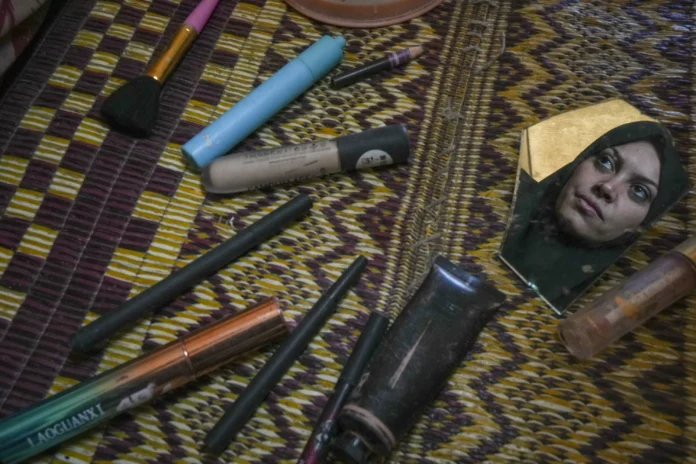In Gaza’s overcrowded tent camps, life is a constant struggle. Families are forced to live in cramped, makeshift shelters, lacking the basic amenities and necessities of life. For women in these camps, the challenges are even greater. Not only do they have to endure the harsh living conditions, but they also face the added hardship of maintaining their modesty and privacy in a space that is shared with extended family members.
The Gaza Strip, a small territory located on the eastern coast of the Mediterranean Sea, has been under a severe blockade for over a decade. The blockade, imposed by Israel, has resulted in scarce resources and limited opportunities for the people of Gaza. As a result, many families have been forced to live in tent camps, where there is a severe shortage of space and resources.
In these tent camps, women are faced with the difficult task of balancing their modesty and privacy with the reality of living in a crowded and limited space. Most of the tents in these camps are made up of one or two rooms, which means that women often have to share the same living space with their parents, siblings, in-laws, and even extended family members. This lack of privacy can be challenging for women, especially when it comes to personal matters such as changing clothes or taking care of personal hygiene.
Furthermore, women in these camps have to deal with the constant presence of men, both within and outside the family. In Palestinian culture, modesty is highly valued, and women are expected to cover up and maintain their distance from men who are not their husbands or close relatives. However, in the cramped spaces of the tent camps, this becomes nearly impossible. Women have to maneuver around men, often strangers, to carry out their daily activities.
Moreover, the lack of proper sanitation facilities in these tent camps poses a significant challenge for women. With limited or no access to clean and private bathrooms, women have to find ways to maintain their hygiene while also respecting cultural norms of modesty. This can be particularly difficult for pregnant women and those with young children who need to constantly use the bathroom.
Apart from the physical challenges, the living conditions in these tent camps can also have a significant impact on women’s mental health. Women are often the primary caregivers in Palestinian families, and the added stress of living in such crowded and difficult conditions can take a toll on their well-being. With little to no privacy, women are unable to find a safe space to relax and unwind, which can lead to feelings of frustration, anxiety, and depression.
Despite these challenges, the women in Gaza’s tent camps continue to show resilience and strength. They find ways to cope with the difficult living conditions and support their families. Many women have also taken on leadership roles within the camps, organizing activities and providing support to other women and children.
Organizations such as the United Nations Relief and Works Agency (UNRWA) and the Red Cross have been working to improve the living conditions in the tent camps. They provide essential services such as healthcare, education, and hygiene kits, which include items such as soap, towels, and menstrual hygiene products, to support women and their families. These organizations also work towards building more permanent housing for families, which would provide women with more privacy and space.
In addition, many women in the camps have come together to form support groups, where they can share their experiences and find solidarity. These groups provide a safe space for women to express their concerns and seek advice from their peers. They also work towards addressing issues such as domestic violence and women’s rights within the camps.
Despite the challenges, the women in Gaza’s tent camps are determined to make the best of their situation. They continue to support their families and communities, and their resilience is a testament to their strength and perseverance. Through their determination and courage, these women are breaking barriers and challenging societal norms, proving that nothing can hold them back from achieving their full potential.
In conclusion, the women in Gaza’s crowded tent camps face numerous challenges in maintaining their modesty and privacy. However, their resilience and determination to overcome these challenges are truly inspiring. It is our responsibility to recognize their struggles and support them in any way possible. With continued efforts from organizations and individuals, we can work towards providing better living conditions for these women and their families, and empower them to thrive despite their circumstances.


